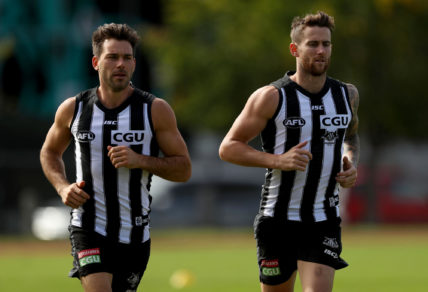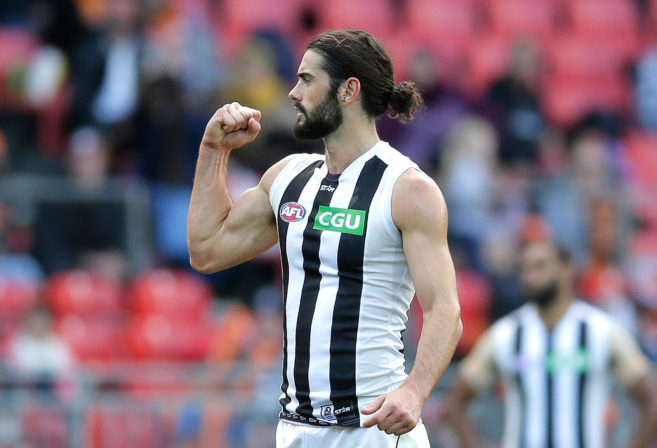The irony of Nathan Buckley’s coaching career has been that so many of his players have been deficient in the area of the game that he was most exquisite in.
Perhaps the most accurate field kick in the history of the game found himself a team whose problem was that it couldn’t consistently hit targets.
The irony was infectious, catching Scott Pendlebury too – a captain whose skillset was made to look even more magical by the inability of his teammates to match it.
Pendlebury, with his ethereal economy of movement, eerie, piercing calmness and precise skills was so often an extra-terrestrial in black and white; surrounded by men stuck in the mud, only able to look at their captain flying, their efforts to join him restricted mostly to inane jumping. But to their credit, they did do fine work in the mud.
It was really 2015 that marked the beginning of the Buckley coaching era at Collingwood – as well as the five-year mark of the club’s partnership with CGU. From 2012 to 2014 he was overseeing the final breaths – or heaving sighs – of the Mick Malthouse premiership team.
2014 was the last season that Nick Maxwell, Luke Ball, Dayne Beams and Heritier Lumumba took the field for the Pies, a year after Dale Thomas, Heath Shaw, Darren Jolly and Alan Didak were moved on.
By 2015, Buckley had his team. Jordan De Goey, Darcy Moore, Brayden Maynard and Mason Cox were taken in the preceding draft, with Jack Crisp, Levi Greenwood and Travis Varcoe arriving via trade. The critical mass was finally tipping and the Magpies became a team that Buckley had built as much as inherited.

Levi Greenwood and Jeremy Howe have been valuable pickups for the Pies. (Photo: Robert Cianflone/Getty Images)
The team’s hallmark quickly became gritty, contested ball. Collingwood games weren’t always pretty and were rarely fluid, but for the most part, they competed and they grinded. They were inconsistent but tough enough to drag the best teams into physical contests, a hint that they might not be too far away.
The 80-73 loss in Perth to the minor premier Dockers in 2015, the 2016 win against the Eagles at the MCG and last year’s early-season win against the Swans in Sydney were testaments to Collingwood’s ability to grind it out and match the competition’s elite – they felt like ‘Collingwood games’, or at least the version of ‘Collingwood’ that fans hoped might more regularly surface.
The most resounding wins of recent years – a third quarter of Jamie Elliott and Dane Swan-inspired hellfire at the MCG toppling the Kangaroos in 2015, blitzing what should have been a desperate Geelong in the penultimate round later that year, and the frenzied, ecstatic comeback wins over Hawthorn and West Coast last season – all came when the grit was made furious.
The hardness and purposeful violence around the ball gathered momentum and the field began to feel like someone had tipped it so the ball was perpetually hurtling downhill towards Collingwood’s goal. They dominated at the contest, won the clearance, booted the ball forward, chased in magnetic numbers, and then by sheer force bullied the ball through the goal.
The issue has always been the lack of a second speed. You can’t play at one million miles an hour all the time and the Pies under Buckley haven’t been good enough at driving around the suburbs. When the grit isn’t frenetic, when it doesn’t have its energy perfectly channelled, the Magpies have struggled to find enough avenues to victory.
Last year’s epic draw against Adelaide was perhaps the quintessential Collingwood game. A magnificent, imposing first-half built on immense, unrelenting and cascading pressure was undermined by a complete inability to halt the opponent’s own supreme pressure in the second half.

“Grit, optimism, resilience and loyalty. These are the values we play by.”
The Collingwood Football Club and CGU have stood by these core Australian values, and the club is now enjoying a resurgence as they head to the 2018 finals.
The AFL is a difficult competition at the best of times, with a taxing 23-round season seeing some of Australia’s best athletes go up against each other.
A challenging set of circumstances face individuals within the club, but upholding the values of the club, they overcome the adversity.
Collingwood’s Sam McLarty is a perfect example of resilience, displaying that in spades to play the sport he loves at the highest level.
“Being deaf is part of my identity. It’s who I am. Growing up, I rejected the notion I was different. I had to prove to everyone that I could do anything I set my mind to.”
Of course, it’s not just McLarty who uses the club’s principles. They apply to the AFLW team as well, with Chloe Molloy chasing her dream of playing footy. Instead of sticking to the straight and narrow by playing basketball, she broke into the Magpies’ AFLW side and made an immediate impact.
“To follow that pathway that you internally want for yourself, you’re going to have to make some sacrifices. I know I probably did upset a few people, but it was a decision I had to make by myself.”
And Adam Treloar, who is giving back to his community by coaching the Noble Park under-12s, personifies loyalty.
“I need to be loyal to my roots and ultimately repay the faith.”
Grit, optimism, resilience and loyalty. They’re the four qualities that Collingwood are proud to embody.

In the modern game, grit on its own is not sufficient – you need wizards to go with handymen. You need Pendlebury, and more than a few more of his ilk if not his calibre.
From 2015 to 2017 Collingwood didn’t have that. There is something deflating about having a team that competes so manfully (the Pies ranked 6th, 6th and 1st in contested ball differential from 2015 to 2017) and then has its hard work undone by simple skill errors.
To gallantly absorb defensive pressure, win a pivotal contest and then see the attack forward immediately undone by a player skidding the ball off his toe 18 metres forward into the corridor and a waiting opponent is a brilliantly crushing.
That has so often been the Collingwood story, and what has cost them pivotal games like those against the Bulldogs, Demons and Giants last season, games where the result that didn’t happen could have shaped their season so differently.
This year’s wins against the Crows and Demons loom, Collingwood hopes, as the new quintessential Collingwood games.
This year the story is shifting. Pendlebury and Steele Sidebottom have always been around for class, but now Jordan de Goey has exploded and Will Hoskin-Elliott has become much more present and impactful. Add in some transformative leg speed and suddenly the team is much more rounded and versatile, capable of undoing opponents in a variety of fashions.
This year’s wins against the Crows and Demons loom, Collingwood hopes, as the new quintessential Collingwood games. The Pies were fierce at the point of attack in both those games, but also powerful beyond it. They won the ball and then made their wins count – with direct, incisive kicking and most of all, lightning quick in-close handballs that release teammates into possibility.
The second victory over Essendon was also telling – a game where the Pies were a little flat and the Dons plenty desperate, but Collingwood eked out a result through both grittiness and brilliance.
The 2018 Pies are made different by their pace and improved skills, but the heart of this team is still their grit, the hardness and willingness in the contest – which was not long ago only a small, often frustrating comfort, but now feels like the core of something triumphant.
CGU Insurance and Collingwood have been loyal partners for almost a decade. Together we’re proud to celebrate the values of all Australians. Find out more here.
All images are credit: Getty Images





























































































